 On June 16, Bloomington Council approved a new ordinance requiring landlords to sign and maintain an affidavit listing occupants of their rental properties. Tenants must also sign. The law applies to buildings with four or fewer units. The original proposal, which council amended, was submitted by the city's Housing & Neighborhood Development (HAND) department and would have required the document be turned into the city. It also would have required tenants to disclose their relationship with each other. Questions about privacy issues prompted revision of the ordinance. The affidavit is intended to help the city track compliance with occupancy limits. Certain zoning districts set a limit of three unrelated adults who can live in a rental unit. Watch the council's June 16 deliberations on CATS here.
0 Comments
 Bloomington Council has voted to approve duplexes as a conditional use in core residential zoning districts. The vote on May 6 was unanimous, and followed a May 5 vote that rejected a duplex ban. The Plan Commission had previously recommended that duplexes be a permitted use. A conditional use requires a hearing in front of the city's Board of Zoning Appeals. Separately, the council also approved constraints, including an annual cap of 15 duplexes citywide. They also imposed a requirement that within a 150-foot buffer of a property where a conditional use permit has been issued for a duplex, no additional duplexes will be allowed for two years. Council will continue its discussion of duplexes on May 12, as part of the ongoing update to the city's Unified Development Ordinance (UDO). 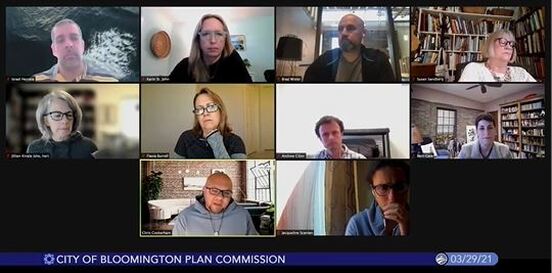 On a 5-4 vote, the Bloomington Plan Commission supported permitting duplexes in all residential zones. Voting in favor were Flavia Burrell, Chris Cockerham, Jillian Kinzie, Karin St. John and Brad Wisler. Voting against were Beth Cate, Andrew Cibor, Susan Sandberg and Israel Herrera. Earlier in the meeting, commissioners rejected an amendment that would have prevented duplexes in all residential districts. That vote was 1-8, with support only from Susan Sandberg. Commissioners also voted 6-3 to remove a requirement that would have prevented more than one duplex built within a 150-foot buffer for a two-year period. The administration/planning staff had recommended duplexes as conditional uses in all residential districts. The recommendation for triplexes and quadplexes is conditional in only R-4, and that remains unchanged at this point. This is part of the city’s UDO update. The next meeting is on Thursday, April 1, at 5:30 p.m. and Beth Cate has indicated that she’ll propose putting a cap on the number of duplexes allowed in each district. After the Plan Commission finishes their updates, this will go to Bloomington Council for final approval. Watch the March 29 Plan Commission meeting here. More information about the UDO process is here. 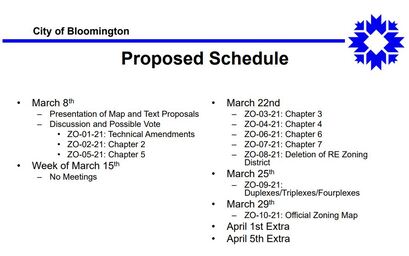 At its March 8 meeting, the Bloomington Plan Commission approved three out of 10 proposed amendments to the Unified Development Ordinance (UDO), starting a formal process that will continue over the next few weeks. The three approved ordinances were: ZO-01-21 (technical corrections for scrivener’s errors, punctuation, references, and/or citations); ZO-02-21 (technical corrections, not substantive changes, in Chapter 2 Zoning Districts); and ZO-05-21 (technical corrections, not substantive changes, in Chapter 5 Subdivision Standards). The next meeting is on March 22. The most controversial revisions – involving duplexes, triplexes and quadplexes – will be considered at the commission's March 25 meeting. A revised zoning map will be on the March 29 agenda. Following action by the Plan Commission, the revisions will be forwarded to the Bloomington Council for final approval. Find more information about the UDO revisions here. 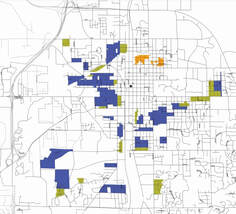 The City of Bloomington planning staff have released a final draft proposal for the Unified Development Ordinance (UDO) that will be heard by the city Plan Commission on March 8. The draft revises some of the initially proposed changes. For example, it pulls back on a controversial plan to allow duplexes, triplexes and quadplexes in several neighborhoods that are predominantly single-family homes. Click here to learn more about the proposal. The Plan Commission's March 8 public hearing on the UDO begins at 5:30 p.m. on Zoom via this link. 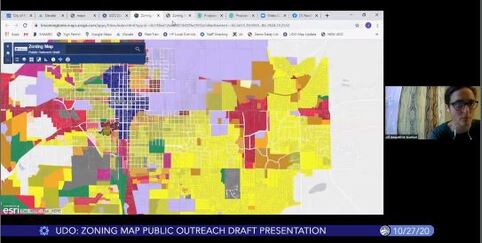 Jackie Scanlon of the Bloomington planning staff at an Oct. 27 forum on the UDO, where she presented an overview of the mapping and plexes proposal. Jackie Scanlon of the Bloomington planning staff at an Oct. 27 forum on the UDO, where she presented an overview of the mapping and plexes proposal. The City of Bloomington is holding a second public forum about the Unified Development Ordinance (UDO) mapping process to focus on the new student housing zone. The meeting on Thursday, Oct. 29 starts at 5:30 p.m. via this Zoom link. The city is continuing a two-year overhaul of the UDO, the city's main zoning document. In addition to updating its zoning map, planning staff are bringing forward text amendments related to duplexes, triplexes and quadplexes. The proposal, if approved by city council, would allow such structures as either conditional or permitted uses in more residential districts. More information, including an online survey, is available on the UDO mapping website. You can watch a recording of the city's Oct. 27 forum, which provided a general overview, here. The planning staff is expected to present a formal proposal to the Bloomington Plan Commission in early 2021. 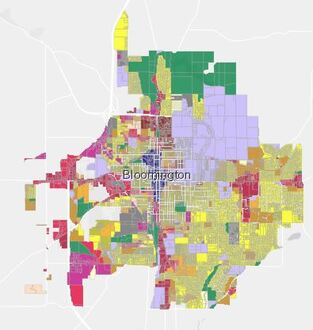 The City of Bloomington has released a draft zoning map as the last phase of a two-year overhaul of the Unified Development Ordinance (UDO), the city's main zoning document. A public forum will be held via Zoom on Tuesday, Oct. 27 from 5:30-7 p.m. with a presentation on the proposed changes and a Q&A session. There will be at least four more meetings in the coming weeks to seek public input, as well as opportunities to provide feedback via online surveys. A website for the mapping project also contains a proposed housing diversity story map, an interactive map where residents can enter their address, and information about opportunities to provide feedback over the next eight weeks. The input collected during this period will help city staff prepare for public hearings in early 2021 to consider and adopt the new zoning map for the city, along with text amendments. The Bloomington City Council has scheduled a series of meetings to work on the draft Unified Development Ordinance (UDO), a major overhaul of the city's zoning code. A new page on the city's website will track all council action on the UDO.
All meetings will begin at 6 p.m. at city hall council chambers, 401 N. Morton, and will include opportunity for public comment. Click here for the memo outlining the council's UDO process. Wednesday, Oct. 16, 2019 Staff presentation on Chapter 1 (Ordinance Foundation) and Chapter 2 (Zoning Districts) Tuesday, Oct. 22, 2019 Staff presentation on Chapter 3 (Use Regulations). This section includes regulations related to duplex/triplex/quadplex development and accessory dwelling units (ADUs) in core neighborhoods. Wednesday, Oct. 23, 2019 Staff presentation on Chapter 4 (Development Standards & Incentives) and Chapter 5 (Subdivision Regulations). Chapter 4 includes regulations related to the affordable housing payment-in-lieu process. Wednesday, Oct. 30, 2019 Staff presentation on Chapter 6 (Administration & Procedures) and Chapter 7 (Definitions) Monday, Nov. 4, 2019 at noon First deadline for council to submit amendments Council will consider proposed amendments at meetings on the following dates: Wednesday, Nov. 13, 2019 Thursday, Nov. 14, 2019 Tuesday, Nov. 19, 2019 Wednesday, Nov. 20, 2019 Second deadline for council to submit amendments: Monday, Nov. 25 at noon. Additional UDO meetings might take place on the following dates: Wednesday, Dec. 4, 2019 Tuesday, Dec. 10, 2019 Thursday, Dec. 12, 2019 Tuesday, Dec. 17, 2019 Wednesday, Dec. 18, 2019 The Chamber's Advocacy Team has been tracking this process since it began in early 2018. Our current advocacy efforts are focused on zoning that eliminates barriers to address this community's residential housing shortage. We're also advocating for greater transparency and clarity in the city's affordable housing payment-in-lieu process. 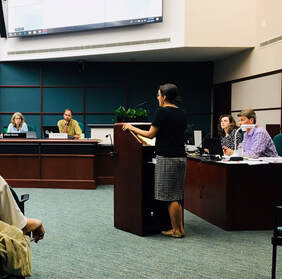 Sept. 10 Plan Commission session. Sept. 10 Plan Commission session. The Bloomington Plan Commission has scheduled three additional meetings to consider amendments to the draft Unified Development Ordinance (UDO). All meetings start at 5:30 p.m.:
1) Duplexes, Triplexes and Quadplexes (Amendments 4A and 4B). In a six-hour meeting on Sept. 5, commissioners heard from 37 residents during a public hearing on the "plexes." In the draft UDO, plexes are a "conditional use" in core neighborhood zones, meaning that the project must go through the city's approval process in order to be built. About half of the speakers were concerned about the additional density that such units would bring to the city's core neighborhoods, and argued that they shouldn't be allowed at all in those parts of the city. An equal number of speakers believed the city needs more housing stock of all kinds, and that this is one way to achieve that goal. OUTCOME: Plexes will remain as a conditional use in core neighborhoods (in the UDO draft), after a Plan Commission amendment to make them permitted use (by right) failed on a 4-5 vote. Voting for by right were Brad Wisler, Nick Kappas, Flavia Burrell and Neil Kopper. Voting against were Beth Cate, Joe Hoffmann, Jillian Kinzie, Susan Sandberg and Karin St. John. Watch the deliberations on CATS here. 2) Accessory Dwelling Units (Amendments 5A and 5B). Plan Commissioners considered these amendments on Sept. 10. In the draft UDO, ADUs were allowed by right. Amendment 5A – making ADUs a conditional use – passed on a 5-4 vote. Voting in favor: Joe Hoffmann, Susan Sandberg, Beth Cate, Jillian Kinzie, and Karin St. John. On an 8-1 vote (with Susan Sandberg opposing), Plan Commissioners also approved Amendment 5B, which increased the number of bedrooms and the permitted size of an ADU. As amended, ADUs will be allowed with up to 2 bedrooms and a maximum 840-square-foot size. OUTCOME: In the UDO draft, ADUs will be a conditional use with up to 2 bedrooms allowed and an 840-square-foot maximum size. Watch the deliberations on CATS here. 3) Payment-in-Lieu (Amendment 7). This amendment was brought forward by Commissioner Flavia Burrell, responding to a recommendation by the Chamber. The intent was to make the process of determining a payment-in-lieu more transparent by requiring approval from the Common Council. Staff objected to that process, however, so on Sept. 10 the Plan Commission amended out the approval requirement. The resulting language is vague and does not specify how the city determines the payment-in-lieu amount. OUTCOME: Amendment 7 passed without the requirement that the Common Council adopt administrative procedures for calculating, collecting, accounting for and spending payment-in-lieu funds. Watch the deliberations on CATS here. Click here to see the city's UDO update site, with details about other amendments, links to the full UDO draft and ways to submit written comments. 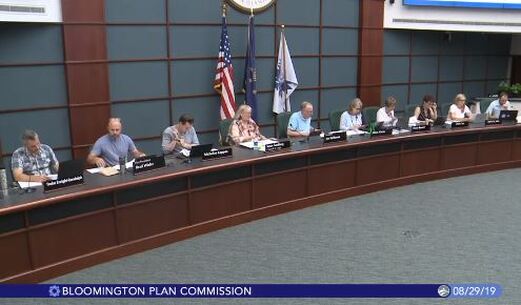 At its Aug. 29 special meeting, the Bloomington Plan Commission 1) passed one “clean-up” amendment to the draft Unified Development Ordinance (UDO), 2) asked staff to develop six amendments for consideration on Sept. 5, and 3) directed staff to prepare another 11 UDO amendments to consider on Sept. 10 or at subsequent meetings. Here’s a roundup of amendments that planning staff will be drafting for the Sept. 5 meeting. They were proposed by Planning Commission chair Joe Hoffmann and unanimously supported by the rest of the commission. The substance of the amendments will be debated and likely voted on at the Sept. 5 session, which starts at 5:30 p.m. at city hall council chambers. UPDATE: It's likely that on Sept. 5 commissioners will only be deliberating on amendments related to duplexes, triplexes and quadplexes. The first set of draft amendments are now posted on the city's UDO update site.
For Sept. 10 or later meetings, here are amendments that planning staff will be drafting, based on Plan Commission requests (the name of the commissioner who proposed each amendment is indicated in parentheses):
Draft amendments are expected to be posted on the city's UDO update site before the Sept. 5 meeting. The following were considered "clean-up" amendments and were passed unanimously by Plan Commissioners at their Aug. 29 meeting. The amendment allows duplexes, triplexes, and fourplexes as permitted uses for new subdivisions and undeveloped locations of the city, while keeping these "plexes" as conditional uses for other areas. The most recent draft had inadvertently designated all duplexes, triplexes and quadplexes as conditional uses. |
Categories
Categories
All
Archives
Archives
May 2024
|
|
Copyright The Greater Bloomington Chamber of Commerce. All Rights Reserved.

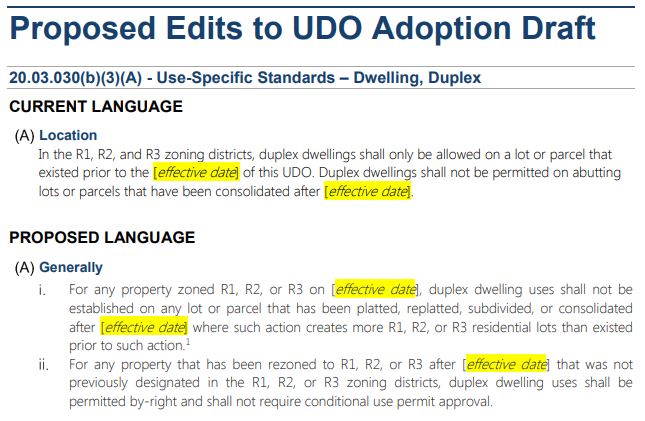
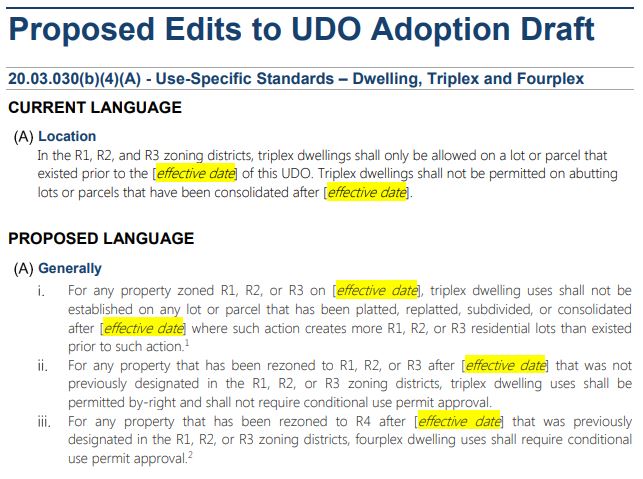
 RSS Feed
RSS Feed
